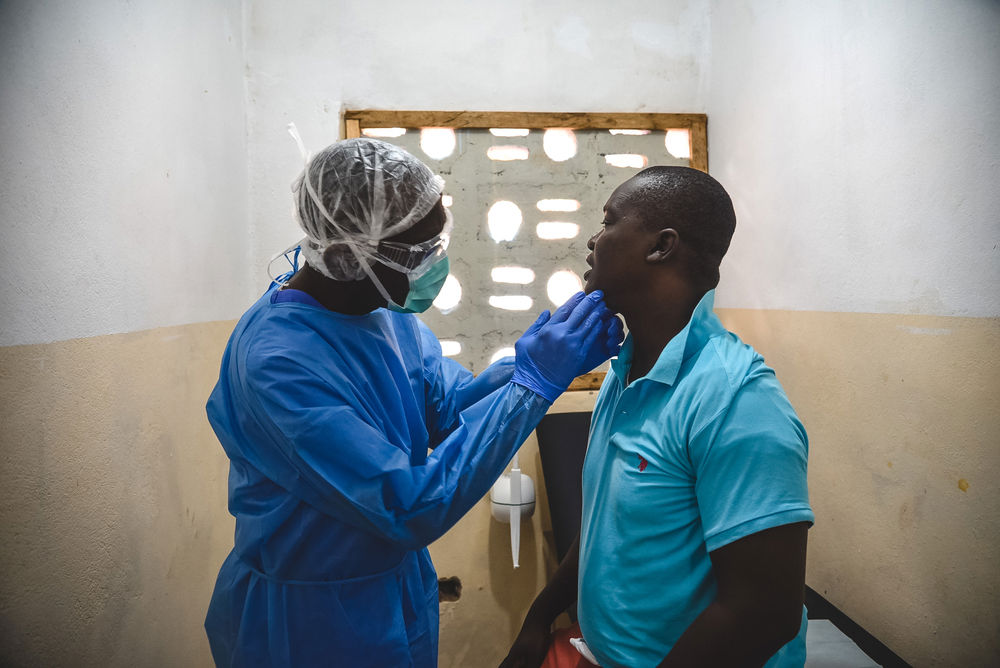Mpox is not new to Sierra Leone. This is the fourth time that we are recording cases. The current outbreak is hitting the Western Area Rural district and the capital city the most, which are densely populated areas with over 1 million residents. On 16 January this year, the Ministry of Health declared mpox a public health emergency. Presently, all districts in the country have recorded cases with over 4,000 cumulative cases being recorded since the outbreak started.
Fatima*, a mother living in western Freetown, noticed that her two-week-old baby, Wilson*, had developed a skin rash and fever. Initially misdiagnosed as a common rash, the symptoms later spread to his legs, and he was confirmed to have mpox after testing.
I am scared. He is so small, and he is my only child. I have given birth to two children before but they both died when they were just babies. I am very confused how he got sick. Nobody in the house is sick, only the baby
Fatima*
Health workers vaccinated her family and nearby neighbors to avoid stigma, and Fatima and her baby were taken to the treatment centre in Calaba Town for care.
To support with the response, MSF rehabilitated the infectious isolation wards of Connaught hospital, which is the national referral hospital, and Kenema government hospital. We also trained Ministry of Health staff on cost-efficient measures like the production of chlorine using water, salt and electricity. Following a spike in the number of confirmed cases, we set up a 50-bed capacity mpox treatment centre for moderate and severe cases in Calaba Town neighbourhood of Freetown.
MSF has also furthered its support to the mpox response in Bombali and Tonkolili districts in the northern province of Sierra Leone working in close collaboration with the Ministry of Health on active health promotion and community engagement targeting at-risk groups as well as contact tracing. Clinical support is also given with case management for moderate and severe cases being done in the Makeni regional hospital in Bombali district and the Magburaka government hospital in Tonkolili district. Our teams support with medical supplies, human resources, training of Ministry of Health staff on case identification, management, sample collection and transportation for testing. In Freetown, the capital city, MSF also donated and installed a generator to the Central Public Health Reference laboratory to reinforce the country’s testing capacity.
Mpox is a contagious viral disease, which can spread between animals and people, as well as through close contact between individuals. When the disease is not treated on time, it can lead to complications and death for affected people, especially if their immune system has been compromised by other diseases. With mpox, patients are in a lot of pain. For some of them, fortunately a minority; their bodies are covered with swollen pustules, and it makes it hard to sit or lay down. There are instances where the pustules entirely cover the genitals which is extremely difficult for the patient.
Agnes Dama is MSF’s medical referent and has supported for mpox response in Sierra Leone since 2018. She supports and coordinates all MSF supported medical activities in relation to the mpox outbreak in the country. She tells us about her daily work and the challenges of treating a disease that is stigmatised, like mpox.
“We received our first patient in the centre on 11 June. I could tell there was a mixture of emotions among my team because for some of them this is their first time providing care for patients with an infectious disease. I had a wave of different emotions seeing patient had several swollen pustules on his body.”
Some patients arrive at the centre feeling as though they have no hope of getting better, and they have seen a lot of misinformation about mpox. It is hard for them to accept that they have mpox and inform their family or friends because of the stigmatisation that they might receive in their communities, and their traditional beliefs about treatment. With the psychosocial counselling we are providing in the centre, I am seeing more acceptance, and patients are slowly getting an understanding of their diagnosis and regaining trust that they can be cured.
Agnes
Umu* aged 25, initially mistook her genital rash for a common infection and self-medicated. When the rash worsened into painful swollen bumps, she sought help at a hospital and tested positive for mpox. She was transferred to the Calaba treatment centre for treatment. “I’ve been in the centre for 1 week now and my condition has changed. I didn’t have bumps all over my body; it was only on my genital and that made it difficult to walk. I would creep on the floor if I needed to move, and urinating was very painful. Every time I see the sores, I use to get really discouraged.” Umu said.
The pain made walking and urinating difficult, and she struggled emotionally. Counselling at the centre helped her cope.
If it wasn’t for the counselling in this centre, I would still be depressed. I am not happy now; but I think I will be ok.
Umu
*Name changed to protect identity



